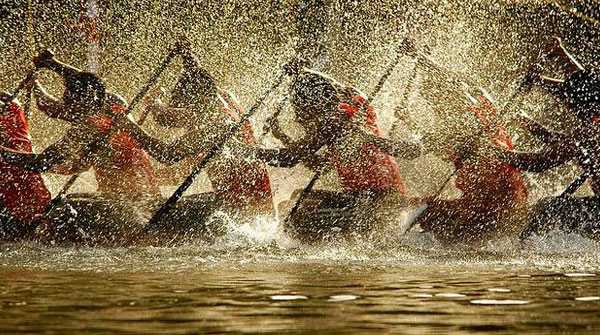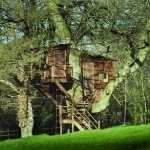A stretch of water flowing between cemented embankments serves as the race track. On either side there is a crowd. It is not difficult to spot the aficionados from the tourists. While the former sit along the patches of the cemented banks braving the irregular showers with an umbrella, the latter relax on the decks of the house boats with sunshades and snacks. Neither is it difficult to identify the drunk ones. They are either falling over each other or into the water.
Those not happy with their seating arrangement have climbed trees bordering the track to get a better view. The drunk ones keep falling off the branches like ripe fruits only to be fished out by the divers on the patrol boats.
We on the other hand stick out like a sore thumb. Neither are we locals in the true sense nor are we tourists. We are misfits in our own land. The fact that we are dressed in jeans and fashionable tees does not really help our case.
We were warned a million times against attending the 60th Annual snake boat race by our respective worried mothers.
“The waves created by the boats are strong and it will topple a speed boat” and ”there is free flowing alcohol and the police cannot contain the men” were some of the unsuccessful threats that were thrown our way.
But I had made up my mind a long time ago. Being a malayalee I think it is a matter of cultural pride that I witness this great spectacle at least once in my life. After all, Pandit Jawaharlal Nehru was so taken aback by an ad hoc race put together for his entertainment that he patronized it wholeheartedly. Today, it is one of Kerala’s most famous annual events.
There are different kinds of race categories. There is even a special one for the women – the Thekakanodi. Women dressed in traditional sarees, oiled hair in a bun with a skirting of jasmine flowers, and muscular hands paint a picture of poise and strength with a single movement of the oars.
Preceding the few minutes that the boats race each other are months of toil, of total celibacy, discipline and abstinence. The different clubs sponsor boats and pay a hefty stipend to muscular men brave enough to spend hours rowing in the hot sun and strong enough to adhere to a celibate life till the race.
Patrons have grown up along the water’s edge watching men practice year after year, looking forward to the one important day of the race and if circumstances allow years later find themselves rowing for a club.
We five cousins find ourselves a dry patch of cement to sit on with our feet dangling over the embankment munching on gourmet sandwiches. We were not really trying to blend in. Not very far from us sits a line of women and children from the nearby villages. Whenever a boat representing their village or club glides by, they call out to the boatmen by name, the younger women shower blessings and luck while the older ones freely sends across snippets of threats if they come back without the trophy.In these parts of the backwaters winning the trophy is a prestige like no other for the entire village.There is a sense of belonging in the air and I feel left out.
Barely have we sat when a couple of drunk men come up and say “Sister, move a bit, we want to pass”. Our first taste to the drunken state of affairs that we were warned against.
My oldest cousin tries to ward them off with the meanest of looks he could muster. It has no effect. If we were in a cartoon then it would be picturised as a rubber arrow hitting a platinum shield. (Oh and don’t forget the sound to go with it). What really amuses me is that not one of the women or children of the local community are disturbed.
“Probably they will get bashed up by the locals if they even look that way” my cousin offers as explanation.
Very soon all the drunk men on our side of the embankment are in a hurry to get to some place which somehow can be reached by making passage only through the narrow strip of cement that we have been sitting on. Had they used the wide open (slushy) land behind they would never reach their destination. Or so it seemed!
“This is the last time we come for this,” with that our cousin shepherded us all away from the embankment and onto higher ground. (Later on admitting that it was worth all the trouble.)
The roar from the crowd announces that the race has begun. Suddenly all men, both drunk and sober watch the water with rapt attention. There are no more cat calls. No one wanting to make passage anywhere. Life has been paused. All senses arrested for the moment.
At first there is an indistinguishable spray of water which soon divides into four distinct sprays declaring that there are four boats racing. Through the million drops of water human forms become visible. Next we see a hundred men, a hundred pairs of hands all moving as one.
Then the sense of sound kicks in and we hear the beats of drums from the vanchipattu or the cheerleaders as they keep beat. The rhythm of the song sets the pace of the oarsmen.
The boat moves forward propelled solely by the muscle power and the synchronous motion of a hundred odd men. At the raised helm of the boat, four men dip long oars in clockwise and counter clockwise steering the boat.
Unlike their name, the boats do not slither across the water. They tread it lithely and with grace.
In less than a minute the boats are in full view. The one on the far left leads and the adjacent one is close behind. The cheerleaders pick up pace. The veins on the sun tanned hands of the oarsmen is clearly visible. In the twenty seconds that it takes to cross the stretch of water within our field of vision, the boat closest to us gathers pace rapidly and when they pass us, they are way ahead of the rest.
The men on the fourth boat, although not too far behind, realise that this is not their year. Disappointment written all over their face, they let go of the oars and jump into the water, swimming to the shore. There shall be no more rowing for them.
And then just like that the reverie is broken.
The race boats have left behind them strong ripples and the drunk men that have jumped in with the hope racing the boats.
The silence, without a moment’s notice gives way to catcalls and drunken orgy.























